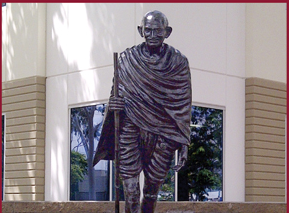Articles/Opinion
OP-ED: Does Gandhi really belong in Parliament Square?
July 12, 2014 | By Priyamvada Gopal

author: Priyamvada Gopal
Mahatma Gandhi’s words have long provided grist for instant inspiration. Either via bumper stickers or nuggets of internet wisdom, you’re likely to have had “An eye for an eye makes the whole world go blind” or “Be the change you wish to see in the world” thrust upon you at some point. So it’s no surprise that Britain announced this week that this “inspiring” signifier of austere piety will be honoured through a statue of his own on Parliament Square next year. Some might argue this is long overdue.
Except that the announcement came as coalition ministers George Osborne and William Hague visited India to hustle for lucrative arms contracts, emerging triumphantly with a £250m deal to supply missiles to the Indian air force and hoping to persuade the former jewel in the imperial crown to buy the partly British-made Eurofighter Typhoon jet.
This plainly opportunistic move has elicited accusations of “false worship” from Gandhi’s descendants. Hague’s glutinous praise for Gandhi’s commitment to non-violence as “a legacy that is as relevant today as it was during his life”, while selling killing machines to his countrymen, is certainly specious. Yet the hawkish rightwing Indian regime these ministers are cosying up to is, with even greater irony, appropriating Gandhi to sanitise its own sectarian past. In Britain as in India, the canonisation of Gandhi has become the perfect vehicle for sanctimonious official rhetoric that obscures the links between capitalism’s military-industrial complex, social hierarchies and state violence.
Further, Britain has also obstinately refused to fully acknowledge its bloodied history of colonial violence. Gandhi, loathed by the more hardline British imperialists, was contemptuously described by Winston Churchill as “a seditious fakir of a type well known in the East, striding half-naked up …to negotiate and parley on equal terms with the representative of the King”. Other colonial leaders liked Gandhi precisely because he was willing to negotiate, prevent violent rebellion, and make large concessions where Indian radicals would have preferred to stand firm.

Osborne’s self-congratulatory suggestion that the “father of democratic India” belongs in front of the “mother of parliaments” rather skips over Gandhi’s dislike for the latter, dismissing it with his distinctive brand of misogyny as a “prostitute” and a “barren woman”. Gandhi was hostile to imitating western political institutions, emphasising the need to draw on indigenous resources which, of course, came with their own embedded flaws. For Britain to simply consecrate Gandhi without discussing his – and our – fraught relationship with the British empire is not so much magnanimous as dishonest.
Friend to prominent Indian industrialists, Gandhi was far from hostile to capitalism, insisting to leftwing critics that there was no antagonism between the interests of labour and capital. Yet it is extremely unlikely that he would wish to be associated with the untrammelled, corporate-driven neoliberalism of the Indian governing classes, and the dismantling of the few provisions for the poor. In the Indian context, his paternalist approach to caste exploitation – calling on the privileged castes to “uplift” the downtrodden – served to marginalise radical voices, such as that of the Dalit leader Bhimrao Ambedkar, who wanted more profound changes. Similarly, at the behest of caste Hindu organisations Conservative politicians have also resisted anti-caste-discrimination legislation in Britain.
For all that Gandhi was a fervent Hindu with the accompanying blind spots around caste and gender oppression, he was not cut from the same cloth as today’s dominant religious nationalists. He opposed vicious religious sectarianism while his vision of a multi-religious India was bitterly resisted by Hindu extremists.
For the likes of Hague to pay cloying lip service to Gandhi’s “view of communal peace and resistance to division” while parlaying for lucrative deals within Hindu extremist circles, to which Gandhi’s assassin was linked, is to at once whitewash the history of Britain’s divide-and-rule colonialism and the dangerous sectarianism it gave rise to.
Gandhi remains a deeply ambiguous figure: a fervent Hindu who advocated religious harmony; a believer in the caste system who deplored “untouchability”; and an anti-colonialist who was willing to compromise with the British empire. This renders him open to appropriation by different interests, some progressive, some retrograde. But we should not allow a statue in Parliament Square to blandly entrench a historical amnesia and diminish a venal and violent present.
Source: THE GUARDIAN
To Get Sikh Siyasat News Alerts via WhatsApp:
(1) Save Our WhatsApp Number 0091-855-606-7689 to your phone contacts; and
(2) Send us Your Name via WhatsApp. Click Here to Send WhatsApp Message Now.
Sikh Siyasat is on Telegram Now. Subscribe to our Telegram Channel
Related Topics: Controversy over Gandhi statues in UK




